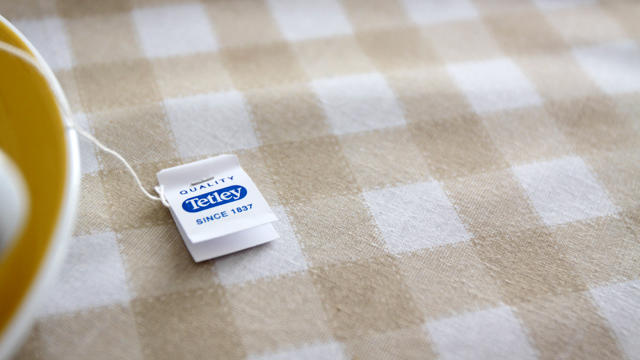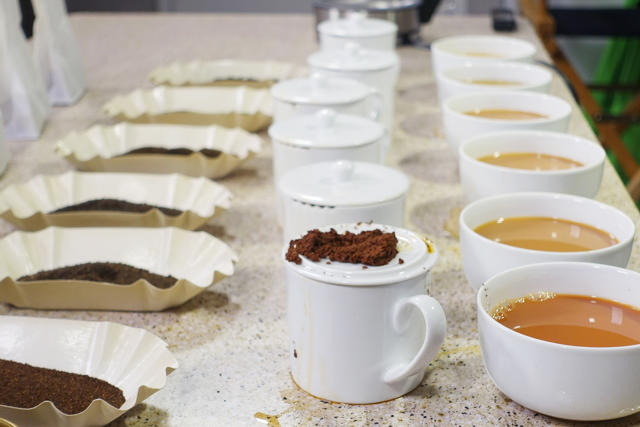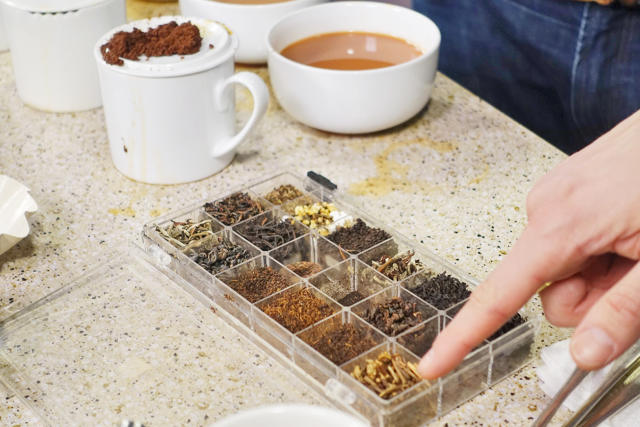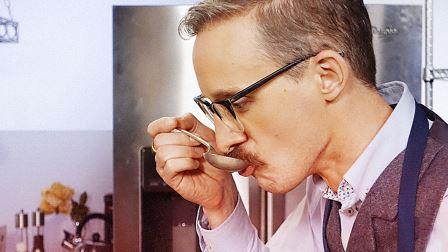How This Master Tea Taster–Whose Tongue Is Insured For £1 Million–Found His Calling
It takes Tetley master blender Sebastian Michaelis more than four months of work to make a single bag of tea. The process involves leaping continents, driving all day on bumpy dirt roads, dealing with seaport strikes, battling buyers at auction houses, delivery trucks sliding off highways, speaking a made-up tea language called “Uhuru,” and enduring weather phenomena that can be so extreme that insurance companies call them “acts of God.”
Should the tea survive all that, the blending begins. That’s the primary role of a tea taster like Michaelis: blending individual flavors of tea so that they always taste the same. It’s not an easy task: like the grapes used to make wine, the taste of the camellia sinensis leaf changes depending on the amount of rain and sunshine it is exposed to as it grows. That’s where Michaelis puts his tongue to work, tasting the tea leaves to determine the right ratios for the production crew.
Michaelis says he has tasted between 300,000 and 400,000 teas during his career and can recognize hundreds of different flavors and characteristics with his tongue, which allows him to grade any tea in the world in just a few seconds. A rare tea, however, might require him to linger on the grade for about a minute. Michaelis’s grading begins with a slurp so loud it sounds like another act of God—and it ends with a spit. He drinks from a silver spoon during his tasting ritual.
“What’s amazing about tea,” Michaelis says, “is that it all comes from one plant, camellia sinensis, which will taste completely different depending on how it is produced.”
Michaelis has been tasting (and spitting) tea for a decade. His bosses at Tetley think so much of his taste buds that they insured them for £1 million. The human tongue has about 10,000 of those buds, so that means each of Michaelis’s buds are valued at about £100 each.

That policy sets the value of his taste buds above both of Rihanna’s legs and on par with both of Keith Richards’s hands or one of Madonna’s boobs, depending on the exchange rate.
That insurance policy has garnered Michaelis much attention since Tetley took it out in October 2014. Perhaps that publicity was the point—if it was, it worked. The bespectacled Michaelis and his bushy mustache have since slurped tea for the media all over the world. And he is, indeed, an excellent proselytizer for the product.
How the 33-year-old became a tea taster is as surprising a chain of events as is the supply chain that leads to the manufacturing a less-than-simple tea bag.
“I didn’t know about tea taster as a job,” he says. “I didn’t realize that was a thing, and a lot of people don’t. You don’t really think about it. You go to the store and pick up your box of tea and you don’t really think about all the work that goes on behind it.”
Michaelis grew up in Bushey and Oxhey in Hertfordshire, England, and earned his philosophy degree in 2004 at Sussex University in Brighton. His parents, he says, were just happy that he had pursued something he was interested in.
“I’ve got to admit I didn’t have a huge plan,” he says. “I knew I wanted to do something different. I didn’t want to do just a regular job where I sit behind a desk.”
Not long after he graduated, a friend showed him an ad that read: Do you like tea? Do you like to travel? Have you got a university degree?
Michaelis applied, not realizing how well his favorite philosophers, Sir Karl Popper and David Hume, would serve him. He landed an interview—along with about 500 other hopeful tea tasters.
The interview process was a rigorous two-day assessment, he says, during which senior tea tasters interviewed him, as well as people in other departments. He also had to pass group problem-solving projects in which he worked with and against other applicants. He quickly learned that being a tea taster is about more than tasting tea. The job also requires overseeing tea supply chains, negotiating tea contracts, and managing projects.
“Interestingly, I’m not the only taster in our business who studied philosophy, so maybe it is a good route for joining the tea trade,” he says. “Overall, philosophy bestows very good analytical and problem solving skills. Thinking outside the box is definitely important in this role, as there are constant and unpredictable challenges that need quick resolution. I think it’s a great subject for learning how to take a holistic approach to solving problems” such as supply chain issues like those seaport strikes and “acts of God.”
After he was offered the job, an apprenticeship began that required him to learn buying and blending—but the real challenge was tasting, he claims, between 500 and 1,000 teas every day for five years.

“Physically, it’s very demanding, but mentally it’s even more challenging,” he explains. “You are learning how to use your sense of taste in much more refined way. It’s like learning to walk again.”
That “refined way” involves the aforementioned slurping and spitting. And as valuable as his taste buds are, they are able to regenerate about every two weeks, so it’s not a huge worry if he burns his tongue on a piping hot cup. The real danger to Michaelis is the safety of his nose.
“In general, I can taste under most conditions,” he says. “But the only thing that stops me is if I have a cold. So if my nose gets banged up, a lot of the senses with taste are based in the nose.” Asked whether Tetley might have been better off insuring his nose, he smiles and says, “Not sure if they looked into the nuance of that.”
On this day, as I watched him taste tea, both his nose and taste buds were in fine order and his slurping was a top-notch vortex each time he raised the brew to his mouth. The power of the slurp is needed to oxygenate the tea, which helps him identify its qualities. But even slurping properly can be difficult for first-timers.
“The stronger you slurp, the more of those flavors you get,” he says, “but if you haven’t done it before—I’ve seen people who’ve it’s come out their noses and they’ve just spat all over the place.”
This is what he is evaluating as he raises his spoonful of tea to his bushy mustache for a loud whoosh:
- Zing: The overall impact in the mouth and how long it lasts in the mouth.
- Color: Usually reds, yellows and oranges.
- Body: As with wine, it’s about the thickness.
- Sparkle: The purity of the color. Full and gray means the quality isn’t very good.
5FVY5OLK and 4FO35NI might not mean much to anyone outside of Tetley, but those are examples of Uhuru, which means “freedom” in Swahili. This in-house language was developed so that each taster could describe the qualities above for any tea around the world to a very fine degree.
Once a Tetley tea taster is fluent in Uhuru and advances past the apprenticeship phase, that person is awarded a silver spoon engraved with the taster’s name. But when the taster retires, the spoon stays behind at the company. Tetley has been in the tea business since 1837, so there’s a lot of history in those spoons. Michaelis holds up one engraved with the name “DJ T Theobold”, who worked at Tetley in the early 1900s.
About 64 years before Tetley was founded, Americans dumped a shipment of tea belonging to the East India Company into Boston Harbor in defiance of the Tea Act. The Boston Tea Party is perhaps at the root of why Americans drink three times as much coffee as they do tea.
An American named Thomas Sullivan is credited with inventing the tea bag in 1908 but Tetley, in 1953, has been given credit as the force behind the adoption of Sullivan’s invention in the U.K.
When Americans do drink tea, it’s iced 85% of the time—but that’s changing. Starbucks dropped “coffee” from its name in 2011 and, since 1980, American coffee consumption has fallen while tea consumption has grown. During the past decade, Michaelis says, Americans have made a real movement toward green teas and herbal and fruit infusions.

What’s also changing is the way tea is produced. While fair trade practices are becoming more popular with more coffee companies, Tetley has aligned itself with the Rainforest Alliance. Michaelis says that 100% of Tetley’s teas would be certified by the alliance in August.
What makes tea so special, according to Michaelis? “It’s not just about the actual drink itself,” he says. “It’s about taking the time off when you’re having a break at work just to destress, taking the time to boil the kettle, brew the tea…it’s the whole feeling around making it.”
Michaelis, and the philosopher inside of him, says that what appealed to him most about the job was that that it’s an ancient trade and that the job requires one to learn for one’s entire life.
“It was natural for me when I saw the advert to see something which I could learn over years and years and become an expert,” he says. “It’s very rare nowadays to find people who know a product very closely. I’ve met a few people who taste coffee, for instance, and even a chocolate taster as well. They’re always very interesting characters, people who want to do something because they love the product. Same with tea. I love tea.”
Fast Company , Read Full Story
(67)


